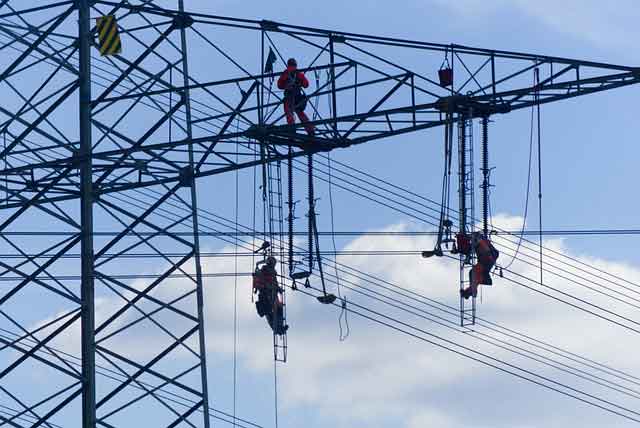California Net Zero Grid Investment will fuel electrification, renewable energy buildout, EV adoption, and grid modernization, boosting utilities, solar, and storage, while policy, IRA incentives, and transmission upgrades drive reliability and long-term rate base growth.
Key Points
Funding to electrify sectors and modernize the grid, scaling renewables, EVs, and storage to meet 2045 net zero goals.
✅ $370B over 22 years to meet 2045 net zero target
✅ Utilities lead gains via grid modernization and rate base growth
✅ EVs, solar, storage scale; IRA credits offset costs
$370 billion: That’s the investment Edison International CEO Pedro Pizarro says is needed for California’s power grid to meet the state’s “net zero” goal for CO2 emissions by 2045.
Getting there will require replacing fossil fuels with electricity in transportation, HVAC systems for buildings and industrial processes. Combined with population growth and data demand potentially augmented by artificial intelligence, that adds up to an 82 percent increase in electricity demand over 22 years, or 3 percent annually, and a potential looming shortage if buildout lags.
California’s plans also call for phasing out fossil fuel generation in the state, despite ongoing dependence on fossil power during peaks. And presumably, its last nuclear plant—PG&E Corp’s (PCG) Diablo Canyon—will be eventually be shuttered as well. So getting there also means trebling the state’s renewable energy generation and doubling usage of rooftop solar.
Assuming this investment is made, it’s relatively easy to put together a list of beneficiaries. Electric vehicles hit 20 percent market share in the state in Q2, even as pandemic-era demand shifts complicate load forecasting. And while competition from manufacturers has increased, leading manufacturers like Tesla TSLA -3% Inc (TSLA) can look forward to rising sales for some time—though that’s more than priced in for Elon Musk’s company at 65 times expected next 12 months earnings.
In the past year, California regulators have dialed back net metering through pricing changes affecting compensation, a subsidy previously paying rooftop solar owners premium prices for power sold back to the grid. That’s hit share prices of SunPower Corp (SPWR) and Sunrun Inc (RUN) quite hard, by further undermining business plans yet to demonstrate consistent profitability.
Nonetheless, these companies too can expect robust sales growth, as global prices for solar components drop and Inflation Reduction Act tax credits at least somewhat offset higher interest rates. And the combination of IRA tax credits and U.S. tariff walls will continue to boost sales at solar manufacturers like JinkoSolar Holding (JKS).
The surest, biggest beneficiaries of California’s drive to Net Zero are the utilities, reflecting broader utility trends in grid modernization, with investment increasing earnings and dividends. And as the state’s largest pure electric company, Edison has the clearest path.
Edison is currently requesting California regulators OK recovery over a 30-year period of $2.4 billion in losses related to 2017 wildfires. Assuming a amicable decision by early next year, management can then turn its attention to upgrading the grid. That investment is expected to generate long-term rate base growth of 8 percent at year, fueling 5 to 7 percent annual earnings growth through 2028 with commensurate dividend increases.
That’s a strong value proposition Edison stock, with trades at just 14 times expected next 12 months earnings. The yield of roughly 4.4 percent at current prices was increased 5.4 percent this year and is headed for a similar boost in December.
When California deregulated electricity in 1996, it required utilities with rare exceptions to divest their power generation. As a result, Edison’s growth opportunity is 100 percent upgrading its transmission and distribution grid. And its projects can typically be proposed, sited, permitted and built in less than a year, limiting risk of cost overruns to ensure regulatory approval and strong investment returns.
Edison’s investment plan is also pretty much immune to an unlikely backtracking on Net Zero goals by the state. And the company has a cost argument as well: Dr Pizarro cites U.S. Department of Energy and Department of Transportation data to project inflation-adjusted savings of 40 percent in California’s total customer energy bills from full electrification.
There’s even a reason to believe 40 percent savings will prove conservative. Mainly, gasoline currently accounts for a bit more than half energy expenditures. And after a more than 10-year global oil and gas investment drought, supplies are likely get tighter and prices possibly much higher in coming years.
Of course, those savings will only show up after significant investment is made. At this point, no major utility system in the world runs on 100 percent renewable energy, and California’s blackout politics underscore how reliability concerns shape deployment. And the magnitude of storage technology needed to overcome intermittency in solar and wind generation is not currently available let alone affordable, though both cost and efficiency are advancing.
Taking EVs from 20 to 100 percent of California’s new vehicle sales calls for a similar leap in efficiency and cost, even with generous federal and state subsidy. And while technology to fully electrify buildings and homes is there, economically retrofitting statewide is almost certainly going to be a slog.
At the end of the day, political will is likely to be as important as future technological advance for how much of Pizarro’s $370 billion actually gets spent. And the same will be true across the U.S., with state governments and regulators still by and large calling the shots for how electricity gets generated, transmitted and distributed—as well as who pays for it and how much, even as California’s exported policies influence Western markets.
Ironically, the one state where investors don’t need to worry about renewable energy’s prospects is one of the currently reddest politically. That’s Florida, where NextEra Energy NEE +2.8% (NEE) and other utilities can dramatically cut costs to customers and boost reliability by deploying solar and energy storage.
You won’t hear management asserting it can run the Sunshine State on 100 percent renewable energy, as utilities and regulators do in some of the bluer parts of the country. But by demonstrating the cost and reliability argument for solar deployment, NextEra is also making the case why its stock is America’s highest percentage bet on renewables’ growth—particularly at a time when all things energy are unfortunately becoming increasingly, intensely political.
Related News












